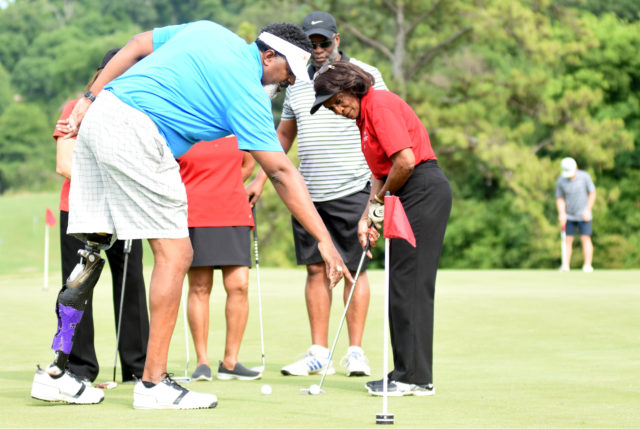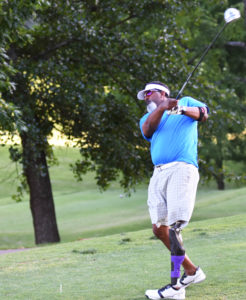
By Solomon Crenshaw Jr.
For the Birmingham Times

Not many blacks played golf where Chris Osborne grew up, but that never stopped the Morristown, Tenn., native from doing what he could to impart his knowledge to others or become a champion golfer—even after his left leg was amputated above the knee following a 2004 hit-and-run motorcycle accident.
The former television journalist and now public information officer for the Jefferson County Department of Health said the accident never plunged him into a state of despair.
“It could have been worse. It could have been my life,” Osborne said. “It was just a period of seeing what opportunities were out there for me to accomplish.”
Those opportunities included a return to the links, even though he would have to relearn the game. His balance was different, and his swing had to be modified.
“I had a lot of good mentors that worked with me,” said Osborne, who is a Paralong Drive World Record holder and champion. “That’s how I was able to get back on top.”
Among amputee golfers, Osborne has reached the game’s pinnacle three times in the Amputee Long Drive Championship; he won his age division (35 and older) and holds the world record of 332 yards, as well as the U.S. long-drive title.
Partly prompted by the help he received, Osborne—taught the game of golf by his father, who played with his buddies from church—lends a willing hand to help others.
“Something Special”
“I tell people, ‘If I can do it, certainly they can.’ I try to give them the tools people gave me to move forward,” said Osborne, who has mentored a group of local female golfers.
“I knew they had something special,” he said. “Where I grew up, there weren’t a lot of black people who played and especially not a lot of black ladies.”
Osborne’s wife, Tiffany, is a member of the Professional Women’s Golf Association Birmingham (PWGA), a group of “women united to learn and enjoy golf,” according to the organization’s website (http://pwgabham.com).
One of Osborne’s students, retired educator Gloria Dennard, has been president of the PWGA since its inception in 2001. Since taking up the game, she has earned at least 30 trophies for her play, including closest to the pin, longest drive, and first- and runner-up finishes with teams.
“We didn’t know how to play golf. We had an interest in golf [and] took some lessons,” recalled Dennard, who first learned the sport with a group of friends.
Osborne and fellow golfers Darryl Jones, a recently retired assistant general manager of operations and technical services with the Birmingham Water Works, and Leonard Smoot, Miles College head golf coach, took PWGA members to the practice range to help them to work on their strokes. The veterans would tweak the stances and grips of the women, who were determined to improve.
“These guys were the most instrumental in getting us acclimated to the game, giving us encouragement, showing us skills, and telling us when we weren’t doing it right,” said Dennard. “Most of the ladies were kind of timid. I think one of them said, ‘I don’t want to look stupid.’ But you’ve got to get out, and you’ve got to try it.”
The ladies learned an important lesson early: “They told us, ‘You can’t look foolish. Everybody messes up from time to time. Come on out here and do it,’” said Dennard, who initially didn’t envision herself as a golfer.
Carnetta Davis, who introduced Dennard to the game, said, “She got bitten by the bug [and] became more into it than I was.”
Davis, who once worked with engineering firm BE&K Inc., received a set of clubs as a Mother’s Day present one year, and her employer encouraged her to form a golf organization of professional women. Though health challenges have kept Davis from golfing any longer, she said, “I was with them in spirit.”
Tough Love
Dennard’s career in education included a stint at Birmingham’s West End High School, and Jones happened to be a former student of hers. According to Dennard, he was particularly hard on her and her fellow PWGA members. Jones counters that he wasn’t mean, just offering some tough love.
“For a first-time golfer, golf is kind of hard,” he said. “The stance, the swing, how you grip the club—all the fundamentals … are very odd if you’ve never done them before. [Golf] can be somewhat frustrating until [you] master those basic skills.
“You don’t want [new golfers] to quit. You want to give them enough encouragement to stick to the process of learning golf because it’s something you can do for a lifetime.”
PWGA member Linda Cunningham agrees that golfers never stop learning the sport: “You can’t,” she said.
“I thought it was a simple game at first, but it’s very challenging. You may have a good day, and you may have a bad day. If it’s a bad day, that means you’ve got to go back and figure out what you did wrong and start over again. It can be quite frustrating, but it’s also enjoyable. And [it’s] very rewarding at times.”
Of course, those moments can be fleeting, Cunningham added: “But I enjoy it. I really do.”
To read more stories of golf in Birmingham, click one of the links below.
The History of Black Golf in Birmingham
Miles Coach Leonard Smoot to be inducted into Golfer Hall of Fame




